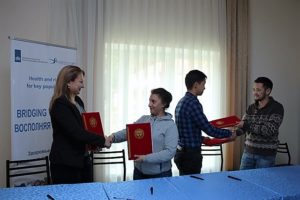 Organizations that work with various key populations in Kyrgyzstan had their first partners’ meeting to develop joint action plan in October 2016. The meeting was attended not only by the staff of organizations working within the framework of the project “Bridging the Gaps: Health and Rights for Key Populations 2”, but also by the representatives of key populations. The main goal was to create a joint action plan for the year of 2017.
Organizations that work with various key populations in Kyrgyzstan had their first partners’ meeting to develop joint action plan in October 2016. The meeting was attended not only by the staff of organizations working within the framework of the project “Bridging the Gaps: Health and Rights for Key Populations 2”, but also by the representatives of key populations. The main goal was to create a joint action plan for the year of 2017.
Four organizations that work with key populations SW, PUD and LGBT in Kyrgyzstan are getting grants within the project “Bridging the Gaps: Health and Rights for Key Populations 2.” It is not a secret that stigma exists within key populations, and the partners’ meeting and common work in the future could help to overcome barriers and build partnerships.
– Before this meeting, the cooperation of key groups existed, but it was scattered, – the representative of the LGBT community Sanjar says. – Only some of the organizations or individuals were working together. I think that now there will be more understanding, cohesion and partnership development. With this meeting we started the construction of the charter community solidarity. We did not know about the problems of each other, but the joint activity will help to get to know them more.
At the meeting, partners developed activities based on common challenges and discussed methods of communication when working together. Organizations that work with different key populations plan to set up a Google group for the permanent exchange of information and will carry out such partnership meetings on an annual basis.
– For me, joint work showed that despite many differences and peculiarities of each particular group, we have many common barriers, which are based, in my opinion, on stigma and discrimination of key populations, – says PUD representative Sergey. – Partners’ meeting was a great opportunity to better understand the challenges that such key populations as LGBT and SW are facing. I was surprised by their professionalism and ability to work together.
Following the meeting, four organizations signed a Memorandum of Cooperation. In the document they agreed to work together to ensure the access of key populations to social, legal, psychological, medical and other services without discrimination, taking into account gender-specifications.



